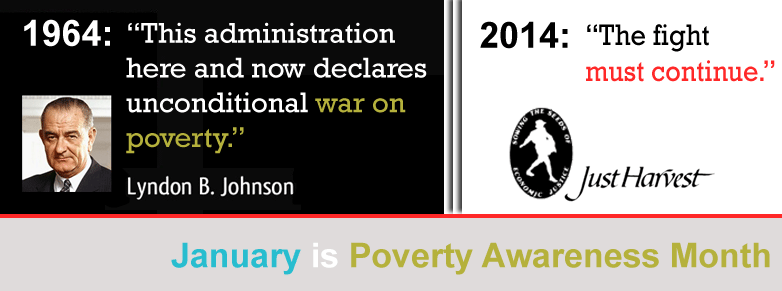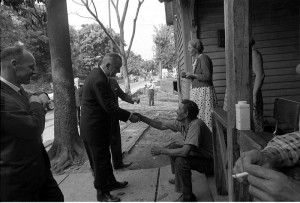“It will not be a short or easy struggle, no single weapon or strategy will suffice, but we shall not rest until that war is won. The richest nation on earth can afford to win it. We cannot afford to lose it.”
With those words, half a century ago today, President Lyndon Johnson declared “unconditional war on poverty in America.”
He was right. The War on Poverty has been neither short nor easy and we still cannot afford to lose it.
He was also wrong. It has not been “unconditional.” It has not lived up to America’s standard of what it takes to win a war. There are no rallies to support these troops. There is no hint – as there should be – that criticizing this war effort is unpatriotic. And there are certainly no monuments to those who have fallen.
50 years after the declaration of war, in a nation with roughly 46 million people living below the official poverty line, what are the lessons?
Lesson One – When war on poverty was declared in 1964, the poverty rate stood at 19%. By 1973, it had fallen to 11.1%, enabling about 17 million Americans to escape from poverty. Desperate malnutrition and near-starvation, widely visible in Appalachia and the Deep South up until the 1960’s, was essentially overcome.
After 1973, progress toward the end of poverty has been minimal. Conservative critics argue that this coincides with the decline of nuclear families and the growth of a nanny state, but it also coincides with the flattening of working class wages, undercutting of unions, globalization of the economy – and rampant wealth inequality. The poverty rate has fluctuated since then, from around 11% in times of “prosperity” to about 15% in downturns like 1982-83, 1993, and the recent Great Recession.
Lesson Two – The persistence of poverty does not mean that the war on poverty was a failure. No sensible commentator argues that public investments in the War on Cancer (begun in 1971 by the Nixon Adminstration) were a waste, even though half a million Americans still die from cancer annually. Every cancer survivor whose treatment is paid for by Medicare should thank both the War on Cancer and the War on Poverty, even if both remain incomplete.
Lesson Three – Let’s not be dewy-eyed with nostalgia for the good-old-days of political consensus on fighting poverty. The 1964 Economic Opportunity Act, Johnson’s anti-poverty legislation, passed in the Senate by a vote of 61-34 and in the House by 226-185 – it was bitterly fought and hard to pass. The opposition was made up of most Congressional Republicans together with most Southern (segregationist) Democrats in a coalition that presaged the political realignment of Nixon’s “Southern Strategy.”
The critics of the war on poverty today are the direct descendants of those who opposed the war on poverty from its earliest days and who have sought to undermine it at every turn. Legislators whose views match Sen. Marco Rubio’s – “isn’t it time to declare big government’s war on poverty a failure?” – never wanted to fight this war in the first place. They opposed the effort from day one, voicing their disgust with any government attempt to lift a finger to help poor people. Thus, their continual promotion of tax breaks for corporations and the wealthy – so that with the resulting revenue shortfall they can then gut budgets in the name of “austerity” and “defict reduction.”
This opposition has left us fighting this war at home with one hand tied behind our back.
Lesson Four –Treating people in poverty as objects of derision and distrust is nothing new. It didn’t start with Mitt Romney’s “47 percent” remark, or with Ronald Reagan’s “Welfare Queen.”
An almost visible wave of resentment has begun to roll across the land against the rackets and abuses that plague the vast, ever-growing American welfare programs. A recent Gallup poll shows that upward of 75 per cent of Americans favor tighter relief rules.”
No, this quote isn’t from Fox News or from the Heritage Foundation or from congressional Republicans pressing for further cuts in food stamps right now. This attack on “the vast ever-growing American welfare programs” appeared in the November 7, 1961 edition of LOOK Magazine – more than two years before LBJ declared War on Poverty. The people who want to cut food stamps today are not making a thoughtful critique of policy. Allegations of poor people’s inherent venality have always been their clarion call.
Anger at the poor for their poverty (justified by accusations, however unfounded, of fraud) is likely just part and parcel of the “pull yourself up by your bootstraps” American Dream. How else can we believe in that old myth while so many millions never make it? The grim but truthful account is not the story of America we like to tell.
Lesson Five – Some of the success of the War on Poverty is not reflected in the official numbers. The public safety net still successfully protects millions from destitution and desperation. But official government measurements of poverty don’t include benefits such as food stamps, or the Earned Income Tax Credit. U.S. Census Bureau researchers estimate that counting tax credits targeted to poor people would lower the current poverty rate by 3.0 percentage points – about 6 million Americans — and counting food stamps would subtract another 1.6 percent – about 4 million.
It is no accident that the largest declines in poverty since before the War on Poverty began have been among the elderly – the very group whose benefits have been the most generous (and least judgmental) in their delivery.
Lesson Six – Those who declare war usually justify their decisions by asserting that they are protecting a way of life. The War on Poverty is no different. We must wage this war to protect the quality of life and basic human rights that every American deserves, or we should not be surprised when that way of life and those rights eventually disappear.
So, what will it take to win the War on Poverty? Yes, it will require beating back the latest round of cuts to food stamps, but it will take a lot more. Yes, it will require a hike in the minimum wage, but it will take a lot more. Like any war, it will require courage, unity of national purpose, willingness to sacrifice, and a battle plan that fights on multiple fronts.
In the War on Poverty speech 50 years ago, President Johnson listed for Congress twelve items in his anti-poverty agenda, each introduced by the phrase, “We must . . . .”
Most of the particulars have changed since 1964. But one thing remains the same: If we’re really going to win the War on Poverty, we must… want to.
Just Harvest Communications Coordinator Emily Cleath contributed to this column







No comments yet.